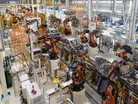PwC: how manufacturers can stay competitive amidst COVID-19

Manufacturing global takes a look at PwC’s strategy for manufacturers looking to gain a competitive advantage amidst the disruption of COVID-19.
When it comes to a crisis like COVID-19, PwC’s Global Crisis Center explains that short term reactions around mobilisation, medium term stabilisation efforts and long term strategizing and transformation plans are required.
“However, we believe manufacturers should strategize now on how they can transform and position their organisation in ways that will give them a competitive advantage and help create greater resilience in a post-crisis world. This ought to be done on the heels of the disruption, throughout the crisis and during recovery,” says PwC.
The strategy for manufacturers
Dealing with disruption
“The timeline for the disruption stage of the pandemic is not fully known, given the number of factors involved: the virus’ contamination period of at least two weeks, asymptomatic carriers, limited testing, and no vaccine or treatment,” comments PwC.
However the company does stress that there will be a recovery at some point, with government and fiscal policies likely to aim for a V-shaped recovery curve.
According to a recent survey conducted by PwC in the US, “67% of CFOs of industrial products companies plan to take advantage of government support programs provided by the CARES Act, with tax payment deferrals and extended tax deadlines cited as the most common types of support they’re considering. Yet, it is unclear to what degree such measures will help mitigate the disruption unleashed by the virus.”
However, the company highlights that given the unclear nature and length of the current disruption, it’s important for leaders to plan a course of action for the eventual recovery, helping them to get ahead of the curve quicker.
Recovery
Although it may seem premature, PwC highlights that it is important to gear up for this next stage, otherwise it may be too late for manufacturers if they wait until
Many businesses are still focused on the triage-like disruption. While the economy is still in dire condition, it may seem premature or even incongruous to be gearing up for the next stage of the operations strategy cycle: recovery. However, we believe it may be too late if manufacturers wait to act until there are clear signs of a recovery.
“That’s a lesson gleaned from the US recession a decade ago, when the global economy was crossing the same threshold we’re now facing. The companies that emerged from that recession strongest (which we call the leaders), moved faster, decisively and more agilely during the recovery phase than their laggard peers.”
According to PwC analysis, leaders:
-
Set their course in 2009 and by 2010, ramped up their efforts
-
Increased capital expenditures by 27% and accessed cash and liquidity
-
Set M&A targets on distressed companies or suppliers
-
Identified growth areas of the business and committed capital
This helped organisations to rebound quicker than their peers. “This time around, it’s important to be mindful of such lessons,” comments PwC.
“These leaders focused on transforming operations through recovery, improving the areas that drive growth and agility.”
Competitive advantage
“Throughout the recovery period, the global effects of the COVID-19 outbreak will reveal changes (some may be permanent) to consumer behaviors and supplier positions. Companies that quickly and thoroughly understand these changes can create a distinct competitive advantage in this next stage of the life cycle,” states PwC. “COVID-19 has been a dramatic reminder that businesses need to be nimble to respond to sudden shifts in demand. Leaders will codify learnings from the disruption and recovery parts of the cycle, and accelerate their transition toward smart, adaptive and resilient ecosystems.”
Resilience
“At the height of the COVID-19 pandemic, governments and citizens turned to industrial manufacturers for critical support — and the industry responded. Companies quickly ramped up production and innovated to produce ventilator parts and personal protective equipment in large volumes. That underscored how crises provide opportunities for businesses to earn trust and enhance reputations,” comments PwC.
The company explains that post crisis it will be important for companies to build on the trust they have established and seize the opportunities to help reshape the markets and their competitive positions.
“Those that get this right will come out on the other side with very different operations, products and services than they had before COVID-19 hit,” adds PwC.
Traits that will set them apart include:
-
Decision support tools, for speed and agility in decision-making
-
Investment in advanced supply chain technology, for clearer and near-real-time visibility in production, inventory and supply
-
Refocused products and services
-
Ramped-up application of digital technologies to understand and anticipate customer behaviors
-
Strengthened and diversified value-chain ecosystems
“Because no economic shock is the same, predicting the future is a fool’s errand. However, while the sector may now be grappling with a different sort of economic crisis, it can be sure of one thing: There will be a progression of waves in this crisis, but it will have an end-point. Forging a well-informed strategy on how to get through the waves of this crisis and then executing on that strategy will help chart a course through what now may seem unnavigable and choppy waters,” concludes PwC.
SEE ALSO:
For more information on manufacturing topics - please take a look at the latest edition of Manufacturing Global

